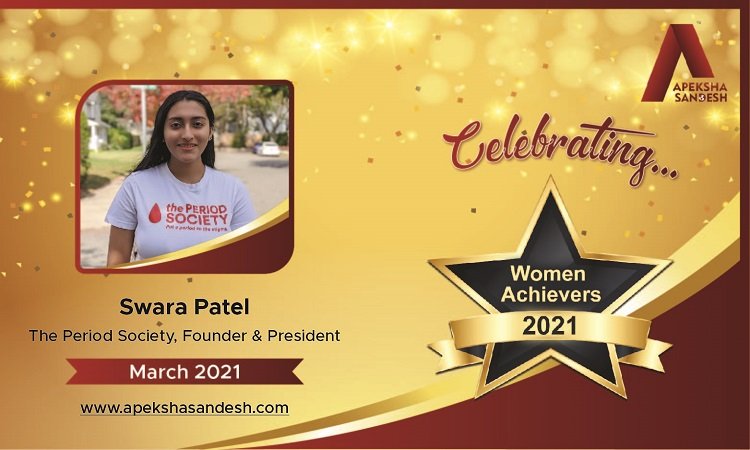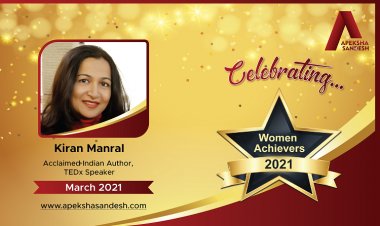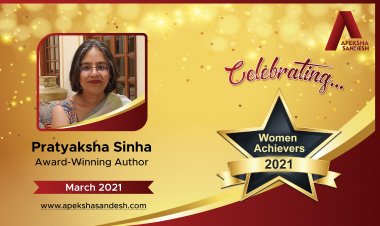Female reproductive health is extremely sexualized, and not considered part of human health, hence menstruation is systematically ignored and stigmatized: Swara Patel, Founder and President of The Period Society

Swara Patel is the Founder and President of The Period Society, a non-profit that she began at the age of 16 based on her personal experiences with the menstrual taboo in India and interactions with women from marginalized communities who struggled to access period products. She is a rising freshman at Macaulay Honors College in New York City and will be a student of the sciences and humanities on a premedical track who aspires to be an OB/GYN tackling some of the most pressing global health challenges when it comes to access to reproductive health and the barriers surrounding the same in marginalized communities worldwide. Extremely passionate about gender equality and reproductive health, she is pumped to expand and amplify ‘The Period Society’ as a platform for Gen-Z in India to put a period to the stigma surrounding menstrual and reproductive health.
So far, she along with her dedicated team has served over a million periods, met the monthly menstrual hygiene needs of over 5,000 women for the next 3 years, and reached over 15,000 people through our menstrual hygiene education sessions. Her initiatives have been funded by and recognized as the first-place winner of the Act2Impact initiative co-hosted by Harvard University’s International Relations Council and Worldview, Jane Goodall’s Roots and Shoots Institute, Brown University’s Erinn Phelan Award, and the Stem for Changemaking Challenging hosted by Ashoka Global and General Motors.
Apeksha Sandesh had a chance to interact with the social worker, Swara Patel. Check out the excerpts!
Tell us something about why and how you laid the foundation of ‘The Period Society’.
Despite being born and brought up in a ‘modern progressive’ family of doctors in Mumbai, my parents were strongly influenced by the menstrual taboo. Changemaking begins at home and it was difficult to convince my parents that this cause could be spoken openly about. Based on the personal experiences with the menstrual taboo in my own family of healthcare professionals shortly after I hit puberty at the age of 12, I quickly realized that the menstrual taboo is real and it is pervasive, people of all backgrounds and every socio-economic stratum in India experience it.
I was exposed to period poverty as a volunteer in a pediatric oncology ward in a hospital in Mumbai when the mother of a patient confided in me that she was struggling to live with dignity since the cost of treatment left her family unable to purchase ‘luxuries’ such as period products. I remember bitterly arguing with my mother each time during Ganesh Chaturthi for being forced to stay at home while my parents visited relatives because I was in my periods. Also, every time I asked my father for pills to ease my cramps, he would ask me to speak about ‘girl things’ to my mother.
It took a lot of persistence, perseverance, and grit to change the attitudes within my house before I stepped out to change ideas within my world. By repeatedly reminding my father that he was a physician and that he knew as well as me that menstrual blood was not ‘dirty blood’ and that he must not choose to shy away from speaking about female reproductive health when he himself did rounds in the OB-GYN department, I eased him into speaking about periods.
Over 2 years, we have definitely come a long way with my father driving me to our sessions and distributing kits when other male dignitaries often awkwardly stand brush off the idea of even touching the kits.
What kind of activities takes place under your campaign?
To speak about what we do at ‘The Period Society’ specifically, we conduct menstrual hygiene education sessions to burst the menstrual taboo by explaining the normal biological process of menstruation as well as eliminate period poverty by providing period products, especially reusable and eco-period products to women who cannot afford them. So far, I have personally conducted menstrual hygiene education sessions in the red-light districts, at municipal schools, with urban slum communities, and in collaboration with other non-governmental organizations.
We have served over a million periods, met the monthly menstrual hygiene needs of over 5,000 women for the next 3 years, and reached over 15,000 people through our menstrual hygiene education sessions. We have chapters working in regions all over India.
During our sessions, we use videos, diagrams, and an interactive session conducted in the local language to explain the biology of periods and burst myths surrounding them, as well distribute period products especially reusable pads, and demonstrate their proper use and care and end with a pledge that we take with our audience to end the stigma surrounding menstruation.
We either hold period product collection drives or fundraisers and whenever possible, prefer to use eco-friendly reusable cloth pads which can last for up to 3 years, thus creating long-term solutions while reducing plastic waste.
How has been your journey so far with ‘The Period Society’?
As a young advocate for menstrual hygiene, especially since I began my non-profit at the age of 16, I was often confronted with the skepticism that my age disengaged my worth. My activism was misconstrued by my community as ‘lipstick and rage’ and my ability to lead was questioned on an account of the fact that I was a ‘high school kid.’ I had to deal with a flood of rejections and ‘no thank-yous’ over calls and emails for collaborations because of my age. I realized the importance of seeking mentorship and not being afraid to try as well as collaborating with like-minded individuals and groups early on in my change-making journey. I also feel that a lot of the credit goes to the team which has kept me motivated, shared the workload, and spearheaded work at TPS during tougher phases.
Nevertheless, the process is extremely rewarding. I think one of our biggest achievements is the fact that within a little over a year, we have truly been able to galvanize young leaders in India around our chapter model and are now operating nationwide in states from Tripura, West Bengal, Maharashtra, Gujarat, Sikkim, Karnataka, and Andhra Pradesh to name a few. We have served thousands of menstruators in India, meeting their menstrual health needs for over 3 years and we achieved this impact in less than a year, thanks to our awesome team of 100+ volunteers and incredibly talented chapter leaders. I am extremely grateful that prestigious platforms such as Harvard University’s International Relations Council, Worldview, Ashoka Global, General Motors - a Fortune 500 company, Brown University Simulation of the United Nation’s Erinn Phelan Award, and Jane Goodall’s Roots and Shoots Institute, to name a few have recognized and supported our work. However, I think every time we help one person choose to break free from the stigma and help one person experience their period with dignity and reach their full potential in society, it makes an impact and it matters to and motivates everyone in ‘The Period Society’ family.
Menstrual taboo in India is still a huge issue. How do you think we can eradicate it?
Open up the conversation! Within your house, or friend circle sparking one uncomfortable conversation can gradually spark change and help break away from taboos as it did in my case. It might not seem like much, but if all of us took the initiative to begin one conversation at home or normalize a topic in our friend circle, imagine what would happen if other people carried it forward and there is this ripple effect, which gradually would lead to acceptance of a topic such as menstruation in a positive manner by society as a whole.
We open the conversation surrounding periods by conducting interactive menstrual hygiene education sessions. During the sessions, not only do we present modules on menstrual health and explain the normal biological process, but we also use videos, interact with our audience, create social media campaigns, and encourage everyone we interact with to speak freely about periods so that we can normalize this taboo by #smashingthestigma. These activities have been quite effective and hence can be tried by others as well.
How can we encourage more women towards menstrual hygiene?
Our motto, ‘put a period to the stigma’ is the main purpose behind our menstrual hygiene education sessions. Many of the taboos surrounding periods in the regions we work in arise from a lack of understanding of the biological process of menstruation. Due to a lack of conversation surrounding the subject compounded by cultural taboos, superstitions, and religious beliefs which are interwoven in the cultural fabric of these communities, people believe that menstrual blood is dirty blood and hence it makes a woman impure. Hence, conducting interactive educational sessions with question and answer sessions, videos, and visual diagrams of the reproductive system in the language which the audience speaks to encourage communities to embrace menstruation as an essential component of reproductive health can be very helpful.
A significant amount of India's menstruating population lacks access to menstrual hygiene products and is thus, compelled to use substitutes such as ash, rags, grass, and leaves leading to complications such as infections in and around the vagina, cervical cancer, sepsis apart from severe effects on reproductive health. We, as a society, must improve accessibility to period products in low-income communities including but not limited to municipal schools, villages, red-light districts, subsidized health clinics, and tribal areas.
Please share some myths and their related facts about menstrual hygiene in India.
So many myths are rooted in the perceived impurity of period blood. The idea that the period blood is negative energy/impurity/sin leaving the body has caused people to isolate menstruators, isolate them from spaces such as the kitchen and temple which are considered clean and sacred respectively. In many communities, women are isolated within period huts or gaokars. There are high absenteeism rates in school due to menstruation.
Additionally, there are many more superstitions with no rationale whatsoever, such as plants withering when touched by someone who is menstruating or not taking a bath during the first days of menstruation.
In your opinion, why are traits such as “innocent”, “sensitive”, “nurturing”, etc. associated with women as compared to more aggressive, competitive terms for men? How can we best promote a more accepting, gender-neutral society?
The ideas are derived from this patriarchal conditioning and the idea of toxic masculinity wherein ‘women repress and men express.’ It is important to stop glorifying traits associated with toxic masculinity and normalize men expressing their emotions and vulnerabilities freely in society. It is also important to recognize that ambition and desire to achieve or excellence are human traits and should not be gendered hence it is important to make sure we do not set different standards when it comes to raising people of all genders.
Does menstrual taboo exist outside India? How are they coping up with it?
The menstrual taboo and stigma definitely exist out of India, and while I cannot specifically comment on a lot of other cultures or countries, I think dialogue and efforts for increased awareness by activists can lead to achieving menstrual equity everywhere. Increased conversation and access to education in schools and households is certainly playing its part.
Describe the scenario of access to reproductive health and the barriers surrounding the same in marginalized communities worldwide. How we can solve the issue in India and at the global level?
I feel that female reproductive health is extremely sexualized, and women’s health/ women's rights are not considered part of human health, hence menstruation is systematically ignored and stigmatized. People of every kind of socioeconomic background and nationality are affected by the taboo since it is rooted in culture and centuries of shame and stigma. We live in a society where parts of the female body such as the vagina are still considered cuss words, hence it is difficult to initiate conversations surrounding menstruation, much less normalize it. A topic ceases to become a taboo when you end the hush surrounding it, hence we #putaperiodtothestigma by opening up conversations surrounding periods which is the best way to normalize it. While we open a conversation on a larger global and national platform, others too can open it at the dinner table or amongst the friend circle or local community. Just normalizing periods within your own circle will translate to huge ripples of change and foster positive societal attitudes towards menstruation collectively. Additionally, learn more about period poverty and the tax on period products so that you begin taking action and having conversations about these pressing issues which intersect or stem from the menstrual taboo.
Sex education, which is either lacking or completely absent in school curriculums in India and abroad is critical to breaking taboos, normalize healthy discussions about the body surrounding topics such as reproductive health, contraception, consent, sexuality/gender, and combatting rape culture. It is also important to begin a greater dialogue within and make institutions such as healthcare more inclusive of and accessible to individuals across the spectrum and undo patriarchal/regressive practices such as shaming people for their sexual history or solely associating reproductive health with childbirth/pregnancy for women.
How do you feel about the way women are represented in the media, films, music, etc.? Can you see yourself in any of them?
While a lot of mainstream media has problematic and tokenistic or stereotypical depictions of women as fitting certain societal beauty standards ideally, being objectified, and having no agency of their own, I see myself in narratives often written by women for women and not for consumption by a voyeuristic male gaze. I identify with films made on women with nuance, grey areas, ambition, heartbreak, and aspirations in equal measures because to me women are not a monolith and there is so much diversity in our experiences and so much to celebrate beyond being reduced to a shy, dutiful daughter or pretty female lead that captures how we interact with society through the lens of gender.
What do you believe will be the biggest challenge for the generation of women behind you?
Breaking free from the patriarchal conditioning that they are victims of yet upholding themselves when they morally police their daughters yet fail to keep up with educating their sons about consent and boundaries, taking on traditional gender roles which limit them while also having the burden of enforcing them in the future. It’s time we break free from this intergenerational thread of patriarchy and redefine these roles to achieve gender equality in its true sense.
Tell us something about your upcoming projects.
Something exciting that we are coming up with within the next few months is ‘The Talk Campaign’, which will help us expand our focus from menstrual equity to increasing access and breaking the wall of silence surrounding sexual and reproductive health.
We also have our own merch line! We have come up with an online store called ‘Menstrual Merch’ and have many more exciting initiatives coming up to support our work. Through our chapter program, I intend to have a representation in every state and city in India because I truly hope our outreach and programs reach the more rural areas of the country, which have the greatest need for this work and we can truly work with underserved and marginalized communities all over India to achieve this vision of becoming a period positive society.
International Women’s Day celebrates the scientific, political, economic, and social achievements of women. In your experience as a successful woman, what is its significance?
More than just a day, International Women’s Day is a movement to remind us of the fight for gender equality and celebration of the contributions of women in so many fields, which goes unacknowledged while simultaneously also keeping in mind the struggles that lie ahead and the work that has to be done.
Apeksha Sandesh congratulates Swara Patel for her contribution and commitment towards society with her initiatives in eradicating menstrual taboo and helping people deal with it. We wish her good luck for all her future endeavours!
Note to our Readers:
The Period Society actively collaborates with other organizations. There are tons of opportunities for students around the world to get involved with our cause remotely or in person. You can begin a chapter or a global initiative of ‘The Period Society’, volunteer to conduct a menstrual hygiene education session/fundraiser/ or pad collection drive for us. You can also remotely join their team to help with outreach, social media management, design graphics or merch, content creation, or writing articles for their blog. If you have a unique pitch about how you want to use your skill sets to contribute to this cause, please don’t hesitate to get in touch with them @periodsociety on Instagram or [email protected].















































